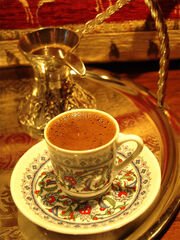Turkish Coffee is coffee prepared by boiling very finely powdered roast coffee beans two or three times in a pot (cezve), possibly with sugar, and serving it into a cup, where the dregs settle. The coffee has a foam on top, rather like the crema on espresso, and the more foam produced, the better the coffee is considered to be. The name describes the method of preparation, not the raw material; there is no special Turkish variety of the coffee bean. It is common throughout the Middle East, North Africa, Caucasus, and the Balkans, and in their expatriate communities and restaurants in the rest of the world.
Coffeehouse culture is highly developed in the former Ottoman world, and this is the dominant style of preparation.
History Edit
Edit
Coffee has its origins in Ethiopia and Yemen. By the late 15th and early 16th century, it had spread to Cairo and Mecca. The Ottoman chronicler İbrahim Peçevi reports the opening of the first coffeehouse in Istanbul: Until the year 962 (1554-55), in the High, God-Guarded city of Constantinople, as well as in Ottoman lands generally, coffee and coffeehouses did not exist. About that year, a fellow called Hâkem (Hakam) from Aleppo and a wag called Şems (Shams) from Damascus, came to the city: they each opened a large shop in the district called Tahtakale, and began to purvey coffee.
Various legends involving its introduction at a "Kiva Han" in 1475 are reported on web sites, but with no documentation. Coffee has affected Turkish culture so much that the Turkish word for breakfast, kahvaltı literally means "before coffee" (kahve means "coffee" and altı "under"), while the Turkish word for brown is kahverengi, literally meaning "the color of coffee". In recent times, Turkish coffee has become less popular than tea (which was grown locally, and could be bought without hard currency), instant coffee, and other modern styles of coffee. At the same time, it is served by international coffee chains such asStarbucks and Gloria Jean's Coffees in their stores located in Turkey, although it remains as an option, not a promoted beverage. Another cultural importance of Turkish coffee is that it is one of the most important elements of matrimonial customs. As a matrimonial prologue the prospective groom's family has to visit the prospective bride's family to ask their permission and blessings for the marriage. During this meeting the prospective bride has to prepare and serve Turkish coffee to the guests. For the groom's coffee the bride uses salt instead of sugar so to understand his general characteristics. If the prospective groom drinks his coffee without any sign of displeasure then the prospective bride assumes that the groom is good tempered and patient.

 Added by
Added by
No comments:
Post a Comment